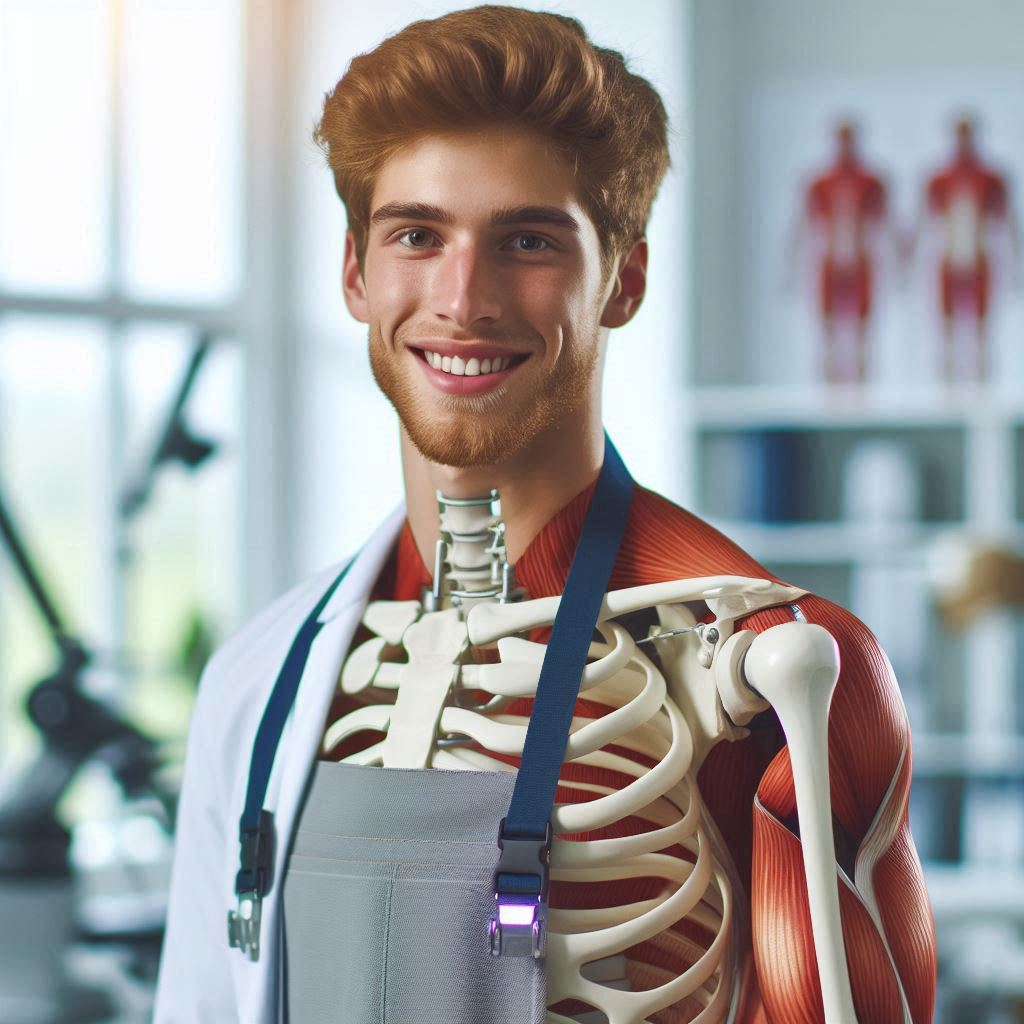Introduction
Orthotists and prosthetists play a crucial role in the healthcare industry, specializing in the design, fabrication, and fitting of orthoses (braces) and prostheses (artificial limbs).
These healthcare professionals are integral in enhancing the quality of life for individuals who have experienced limb loss or require orthotic support due to musculoskeletal or neurological conditions.
Orthotists and prosthetists are trained to assess patients’ needs comprehensively, considering their medical history, functional abilities, and lifestyle goals.
By customizing orthotic devices or prosthetic limbs, these specialists provide personalized solutions that improve mobility, function, and comfort for their patients.
For individuals who have undergone limb amputation, prosthetists play a vital role in restoring mobility and independence.
They meticulously craft prosthetic limbs that are not only biomechanically efficient but also cosmetically appealing, helping patients regain confidence and psychological well-being.
Orthotists, on the other hand, focus on orthoses that support, align, or correct deformities or functional impairments.
These devices can range from simple braces to complex orthotic systems tailored to address specific musculoskeletal conditions such as scoliosis, arthritis, or cerebral palsy.
By providing orthotic interventions, orthotists enable patients to maintain or improve their mobility, prevent further complications, and enhance their overall quality of life.
The impact of orthotists and prosthetists extends beyond physical rehabilitation; it encompasses emotional support and empowerment.
These professionals work closely with patients throughout the fitting and adjustment process, ensuring that each device meets the individual’s unique needs and preferences.
In fact, orthotists and prosthetists are instrumental in bridging the gap between medical treatment and functional independence.
Their expertise not only facilitates physical rehabilitation but also fosters resilience and optimism among patients facing mobility challenges.
As integral members of the healthcare team, orthotists and prosthetists exemplify dedication to improving lives through innovation, compassion, and personalized care.
Criteria for evaluating top universities
Choosing the right university for orthotist/prosthetist programs is crucial for aspiring professionals looking to excel in this specialized field of healthcare.
Several key criteria can help evaluate the top universities offering these programs:
Accreditation Status of the Program
Accreditation ensures that the orthotics and prosthetics program meets rigorous educational standards set by accrediting bodies.
Look for programs accredited by the Commission on Accreditation of Allied Health Education Programs (CAAHEP) or the National Commission on Orthotic and Prosthetic Education (NCOPE).
Accreditation not only validates the quality of education but also ensures graduates meet eligibility criteria for certification.
Curriculum and Coursework Offered
A robust curriculum is essential for comprehensive learning in orthotics and prosthetics.
Transform Your Career Today
Unlock a personalized career strategy that drives real results. Get tailored advice and a roadmap designed just for you.
Start NowTop programs typically offer a blend of theoretical knowledge and practical skills development.
Look for courses covering anatomy, biomechanics, materials science, and advanced prosthetic technologies.
Hands-on workshops and simulated patient experiences enrich the learning process, preparing students for real-world challenges.
Faculty Qualifications and Expertise
Highly qualified faculty members with extensive experience in orthotics and prosthetics contribute significantly to the quality of education.
Look for programs where faculty members are actively engaged in research and clinical practice.
Their expertise not only enhances classroom learning but also provides invaluable mentorship and guidance to students.
Clinical Internships and Hands-on Training Opportunities
Clinical internships and hands-on training are integral to gaining practical experience in orthotics and prosthetics.
Top universities collaborate with healthcare facilities and rehabilitation centers to provide students with diverse clinical placements.
These opportunities allow students to apply classroom knowledge in real clinical settings, working under the supervision of experienced practitioners.
Choosing a university for orthotist/prosthetist programs involves careful consideration of these criteria to ensure a well-rounded educational experience.
By selecting an accredited program with a comprehensive curriculum, experienced faculty, and ample hands-on training opportunities, aspiring orthotists and prosthetists can lay a solid foundation for a successful career in improving the lives of patients with physical disabilities.
Read: Exploring the Salary Range for Optometrists in the USA
University of Washington
Overview of the orthotics and prosthetics program
The University of Washington offers a comprehensive program in orthotics and prosthetics, providing students with a strong foundation in patient care and clinical skills.
Accreditation status and affiliations
The program at the University of Washington is accredited by the National Commission on Orthotic and Prosthetic Education (NCOPE) and is affiliated with top healthcare institutions.
Highlights of the curriculum and coursework
- Students will learn about anatomy, physiology, biomechanics, and materials science.
- Hands-on training in designing and fabricating orthotic and prosthetic devices.
- Clinical rotations in various healthcare settings to gain practical experience.
- Interdisciplinary courses to enhance communication and collaboration skills.
Graduation rate and job placement statistics
The University of Washington has an impressive graduation rate, with a high percentage of graduates finding employment in the field shortly after completing the program.
The job placement rate for graduates is consistently above 90%, showcasing the program’s success in preparing students for successful careers in orthotics and prosthetics.
Read: Optometry Career Outlook: Job Opportunities and Growth

Northwestern University
When it comes to pursuing a Master of Prosthetics-Orthotics program, Northwestern University is a top choice for students looking for a comprehensive and rigorous curriculum.
Overview of the Master of Prosthetics-Orthotics Program
The program at Northwestern University is designed to provide students with a strong foundation in both prosthetics and orthotics, preparing them for a successful career in the field.
Showcase Your Business Today
Reach thousands of readers actively exploring professional services. Publish your business profile and grow your audience now.
Publish NowStudents will learn about various prosthetic and orthotic devices, as well as the biomechanics and anatomy of the human body.
The program also emphasizes clinical skills and patient care.
Faculty Expertise and Research Opportunities
One of the key strengths of Northwestern University’s program is its renowned faculty members who are experts in the field of prosthetics and orthotics.
Students have the opportunity to learn from these experienced professionals and benefit from their knowledge and expertise.
In addition, the university offers research opportunities for students who are interested in pursuing research in the field of prosthetics and orthotics.
This allows students to gain valuable research experience and contribute to the advancement of the field.
Clinical Rotations and Externship Experiences
Northwestern University’s program places a strong emphasis on clinical experience, with students completing clinical rotations in various healthcare settings.
These rotations provide students with hands-on experience working with patients and applying their skills in real-world situations.
In addition, students have the opportunity to participate in externship experiences, where they can further develop their skills and knowledge under the supervision of experienced professionals.
These experiences help students build their confidence and competence in the field.
Success Stories of Alumni in the Field
Many alumni of Northwestern University’s program have gone on to have successful careers in the field of prosthetics and orthotics.
They have made significant contributions to the field and have been recognized for their expertise and dedication.
Whether working in clinical settings, research institutions, or academic settings, Northwestern University alumni are making a difference in the lives of patients and advancing the field of prosthetics and orthotics.
In short, Northwestern University offers a top-notch program for students interested in pursuing a career in prosthetics and orthotics.
With a strong curriculum, experienced faculty, and ample opportunities for hands-on learning, students can be confident in their ability to succeed in this rewarding field.
Read: Essential Skills for a Successful Orthotist/Prosthetist Career
University of Pittsburgh
Details of the Orthotics and Prosthetics Program
The University of Pittsburgh offers a specialized program in orthotics and prosthetics that provides students with a strong foundation in the field.
The curriculum covers a range of topics, including biomechanics, materials science, and patient care.
Students have the opportunity to work with cutting-edge technology and equipment, gaining practical experience that prepares them for a successful career in the field.
Industry Partnerships and Collaborations
The University of Pittsburgh has strong partnerships with industry leaders in orthotics and prosthetics, providing students with access to the latest advancements in the field.
These partnerships also give students the opportunity to participate in research projects and internships with leading companies, further enhancing their education and career prospects.
Emphasis on Research and Innovation in the Field
At the University of Pittsburgh, research and innovation are key components of the orthotics and prosthetics program.
Students have the opportunity to work on cutting-edge research projects, collaborate with faculty members on research initiatives, and explore new developments in the field.
This emphasis on research ensures that students are well-prepared to be leaders in the orthotics and prosthetics profession.
Post-graduation Support and Resources for Students
Upon graduation, students from the University of Pittsburgh’s orthotics and prosthetics program have access to a wide range of resources to support their career development.
The university’s career services department offers guidance on job searches, networking opportunities, and post-graduation internships.
Additionally, alumni from the program are part of a strong professional network that can provide mentorship and advice as students navigate their careers in orthotics and prosthetics.
Read: Why Regular Eye Checkups with an Optometrist Matter
Eastern Michigan University
Eastern Michigan University offers a comprehensive program in orthotics and prosthetics known for its excellence and innovation.
Overview of the Orthotics and Prosthetics Program
The program at Eastern Michigan University provides students with a strong foundation in biomechanics, anatomy, and patient care.
Students learn to assess patients’ needs, design and fabricate orthotic and prosthetic devices, and provide ongoing care and support.
Unique Features and Specialized Tracks Offered
- The program offers specialized tracks in pediatrics, sports medicine, and advanced prosthetic technology.
- Students have the opportunity to gain practical experience through clinical rotations at top healthcare facilities.
Integration of Technology in the Curriculum
Eastern Michigan University emphasizes the use of cutting-edge technology in the orthotics and prosthetics program.
Students have access to state-of-the-art tools and equipment to enhance their learning experience and practical skills.
Student Organizations and Networking Opportunities
- Students can join the Orthotics and Prosthetics Student Association to connect with peers and industry professionals.
- The university hosts networking events, career fairs, and workshops to help students build connections in the field.
Overall, Eastern Michigan University’s orthotics and prosthetics program prepares students for successful careers in this rewarding and growing healthcare field.
Conclusion
When it comes to pursuing a career in orthotics and prosthetics, several universities stand out for their exceptional programs.
One top university for orthotist/prosthetist programs is Northwestern University, known for its strong clinical training and research opportunities.
Another excellent option is the University of Pittsburgh, which offers a comprehensive curriculum and state-of-the-art facilities for hands-on learning.
The Georgia Institute of Technology also ranks highly for its innovative approach to orthotics and prosthetics education, combining engineering and healthcare principles.
Rounding out the list is the University of Washington, where students benefit from a multidisciplinary approach to patient care and cutting-edge technology.
These universities have established themselves as leaders in the field, providing students with the skills and knowledge needed to succeed as orthotists and prosthetists.
Showcase Your Business Today
Reach thousands of readers actively exploring professional services. Publish your business profile and grow your audience now.
Publish NowIn summary, the top universities for orthotist/prosthetist programs include Northwestern University, University of Pittsburgh, Georgia Institute of Technology, and University of Washington.
It is crucial for aspiring orthotists/prosthetists to choose an accredited program with strong clinical training to ensure a successful career in the field.
To all those pursuing a career in orthotics and prosthetics, stay focused on your educational journey and career goals – the future is bright for those dedicated to making a difference in the lives of others through this rewarding profession.
[E-Books for Sale]
The Big Book of 500 High-Paying Jobs in America: Unlock Your Earning Potential
$19.99 • 500 High-Paying Jobs • 330 pages
Explore 500 high-paying jobs in America and learn how to boost your career, earn more, and achieve success!
See All 500 High-Paying Jobs of this E-Book
1001 Professions Without a Degree: High-Paying American Jobs You Can Start Now
$19.99 • 1001 Professions Without a Degree • 174 pages
Discover 1001 high-paying jobs without a degree! Unlock career tips, skills, and success strategies for just $19.99!




